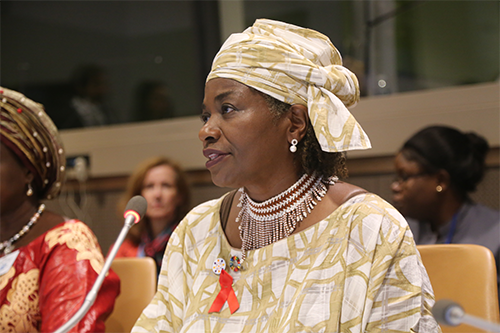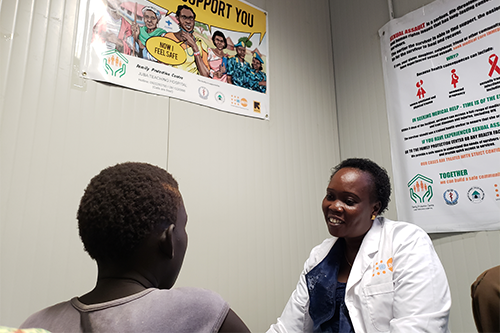News
Leaders call on world to end scourge of gender violence
- 26 September 2019
News
JUBA/KINSHASA/NEW YORK – Betty* is a survivor. The South Sudanese teenager has risen above a horrific act of violence and reclaimed her life. But her heroic act of recovery should never have been necessary, leaders at the United Nations emphasized on Tuesday at a panel discussion on gender-based violence.
Betty was 16 years old when four armed men in uniform broke into her family’s home and gang raped her.
“She was unconscious when she was found by her parents,” Dr. Natalia Kanem, UNFPA’s Executive Director, recounted at the panel discussion, which took place on the sidelines of the 74th session of the UN General Assembly.
Betty’s parents brought her to a facility that provides comprehensive services for survivors of gender-based violence. She received medical care, counselling and was able to stay at a safe house for child survivors.
Now 17, Betty has resumed classes.
“She still is regularly receiving the type of psychosocial support that is allowing her to go back to school,” Dr. Kanem said. “And I will tell you, as a medical doctor, but also as a fellow human being, that this type of support is life-saving.”
But supportive services are not enough, she underscored.

“Much more needs to be done on the prevention side to stop things like this from happening in the first place.”
“Violence against women is a persistent problem occurring in every culture and group,” Nunu Kumba, South Sudan’s minister of gender, child and social welfare, told leaders assembled at the event in UN Headquarters.
But women’s vulnerability escalates in times of crisis.
South Sudan and the Democratic Republic of the Congo – two of the co-conveners of the event – have seen particularly widespread sexual and gender-based violence, both during and in the aftermath of conflict.
Eradicating this violence requires a wide range of efforts, Minister Kumba reflected. “Holistic care, health, psychosocial support services” are essential.
Countries must also ensure justice. “We have stated establishing special gender-based violence courts and involving the military in trying to assure that their personnel are actually prosecuted,” she said.
Family protection centres, like the one that Betty visited, are helping to connect survivors to all of these services. These centres are supported by the Joint Programme on Gender-Based Violence, a collaboration between UNFPA, the Government of South Sudan and the UN Country Team, bringing the full range of care to survivors free of charge.
The first such centre was launched in Juba in November 2017, and five more have since been opened in Rumbek, Malualkon, Wau, Torit and Bor. Three more are expected to open within the year.
Services and referrals are also available through women-friendly spaces, located in civilian protection camps. “Here, women also come together to talk about their day-to-day challenges. They share personal stories and learn from each other,” Nyanger Dak told UNFPA earlier this year at a women-friendly space in the Bentiu protection camp.
We must also “reduce tolerance of gender-based violence through the promotion of community dialogue,” Minister Kumba said.
Such dialogues often begin by raising awareness of human rights.
“Previously, we did not know about the right to be free from violence,” a community member told UNFPA in the Democratic Republic of the Congo. “Domestic violence was considered to be demonstrating strong masculinity.”
Community discussions – including many supported by UNFPA – are making a difference, the community member said. “Before this sensitization, when neighbours witnessed domestic violence, they did not do anything. After, many community members, even men, report when they see domestic violence cases.”
UNFPA is also training health, legal, counselling, social service and police officials to provide sensitive care to survivors of violence, and to refer them to comprehensive services.
“Trainings were very beneficial for our staff,” one health worker reported. “We would like to request trainings for all health staff in the region, so that everyone in health sector becomes ready to respond to gender-based violence.”

The family protection centres in South Sudan have so far reached more than 1,500 survivors of sexual and gender-based violence. These centres are supported by Canada, Norway, Sweden, Switzerland and the European Union; reproductive health services and referrals provided in the protection camps are supported by Japan.
In the Democratic Republic of the Congo, some 30,000 people have received information about gender-based violence through awareness sessions, safe spaces and health services, and five safe spaces have been established in areas with high need. These projects are supported by the Government of Japan.
The panel discussion on Tuesday was also supported by the Government of Canada, the EU, UNFPA, UNDP and the UN Office for the Coordination of Humanitarian Affairs.
“In every corner where we work, this is a commitment that we must make: to come on strong,” Dr. Kanem said at the conclusion of her remarks, “and end this scourge once and for all.”
*Name changed for privacy and protection